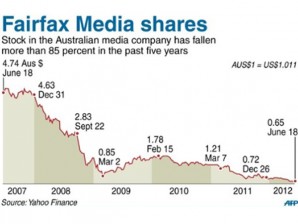
Graphic charting the five-year history of Fairfax Media shares. The company said Monday it will slash 1,900 jobs and introduce paywalls on its flagship titles. AFP
SYDNEY – One of Fairfax Media’s largest shareholders warned Wednesday that the Australian firm’s flagship titles faced closure without a major turnaround, describing them as “worth less than nothing”.
Funds management firm Allan Gray, which owns nine percent of Fairfax and is its third-biggest stakeholder, said the Sydney Morning Herald and The Age may shut if a radical digital-focused overhaul fails to succeed.
“The metro papers are already worth less than nothing. They’re a liability. But if that continues you’ll probably just shut them down at some point,” Allan Gray managing director Simon Marais told ABC radio.
“If people don’t buy papers any more, they’ve got to face the possibility that those papers won’t exist in a few years.”
Fairfax announced Monday that it would sack 1,900 workers, consolidate its staff across the two cities into a single newsroom and put the two major dailies behind a paywall, also downscaling their print format to tabloid.
The Age and Sydney Morning Herald are the only major rivals to Rupert Murdoch’s dominance of the Australian newspaper sector, of which his local arm News Limited controls 70 percent.
Both media companies are suffering as readers and advertisers abandon newspapers for online, with News Limited also poised to announce job cuts as it streamlines its print and online businesses.
Outspoken mining tycoon Gina Rinehart is circling Fairfax, becoming the company’s largest investor with a series of recent share raids taking her holding to 18.67 percent and sparking fears about editorial independence.
From a business perspective, Marais said Fairfax’s regional and online sectors were far more profitable than the metro newspapers and “at some point it’s unfair to expect a small portion of investors… to pay for media diversity”.
“The only hope one could probably have for these papers is that we are in the midst of a big consumer recession and if those conditions were to improve then the revenue for the paper may improve and that may solve the problem.”
He said Allan Gray would have no problem with Rinehart questioning whether the newspapers’ content was “generating revenue and should be culled” but warned against damaging the brand’s credibility.